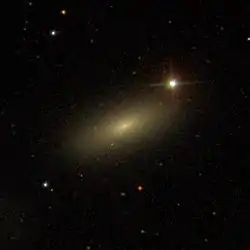NGC 4436
NGC 4436 is a lenticular or dwarf elliptical galaxy located about 60 million light-years away[3][4] in the constellation of Virgo.[5] NGC 4436 was discovered by astronomer William Herschel on April 17, 1784.[6] The galaxy is a member of the Virgo Cluster.[7]
| NGC 4436 | |
|---|---|
 SDSS image of NGC 4436. | |
| Observation data (J2000 epoch) | |
| Constellation | Virgo |
| Right ascension | 12h 27m 41.2s[1] |
| Declination | 12° 18′ 57″[1] |
| Redshift | 0.003749/1124 km/s[1] |
| Distance | 58,350,000 ly[2] |
| Group or cluster | Virgo Cluster |
| Apparent magnitude (V) | 14.0[1] |
| Characteristics | |
| Type | S0, dE6[1] |
| Size | ~35,500 ly (estimated)[1] |
| Apparent size (V) | 1.91 x 0.67[1] |
| Other designations | |
| PGC 40903, UGC 7573, VCC 1036[1] | |
Interaction with NGC 4431
NGC 4436 is undergoing a tidal interaction with a nearby dwarf elliptical galaxy known as NGC 4431. The two galaxies are separated by around 58,680 light-years (18 kpc).[8]
See also
References
- "NASA/IPAC Extragalactic Database". Results for NGC 4436. Retrieved 2017-10-06.
- "parsecs to lightyears conversion". Retrieved 2017-09-30.
- "Your NED Search Results". ned.ipac.caltech.edu. Retrieved 2017-10-07.
- "Calvin College". www.calvin.edu. Retrieved 2017-10-07.
- Rojas, Sebastián García. "Galaxy NGC 4436 - Lenticular Galaxy in Virgo Constellation · Deep Sky Objects Browser". DSO Browser. Retrieved 2017-10-07.
- "New General Catalog Objects: NGC 4400 - 4449". cseligman.com. Retrieved 2017-10-07.
- "Detailed Object Classifications". ned.ipac.caltech.edu. Retrieved 2017-10-07.
- Corsini, E. M.; Aguerri, J. A. L.; Debattista, Victor P.; Pizzella, A.; Barazza, F. D.; Jerjen, H. (27 March 2007). "The Bar Pattern Speed of Dwarf Galaxy NGC 4431". The Astrophysical Journal. 659 (2): L121–L124. arXiv:astro-ph/0703332. Bibcode:2007ApJ...659L.121C. doi:10.1086/518035. S2CID 118982596.
External links
| Wikimedia Commons has media related to NGC 4436. |
- NGC 4436 on WikiSky: DSS2, SDSS, GALEX, IRAS, Hydrogen α, X-Ray, Astrophoto, Sky Map, Articles and images
This article is issued from Wikipedia. The text is licensed under Creative Commons - Attribution - Sharealike. Additional terms may apply for the media files.
